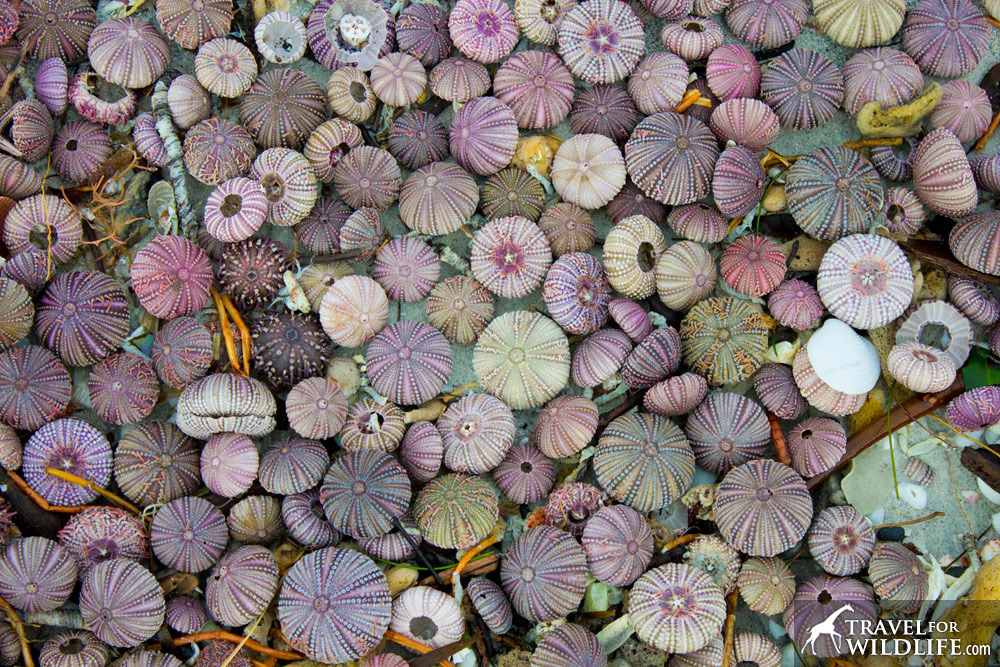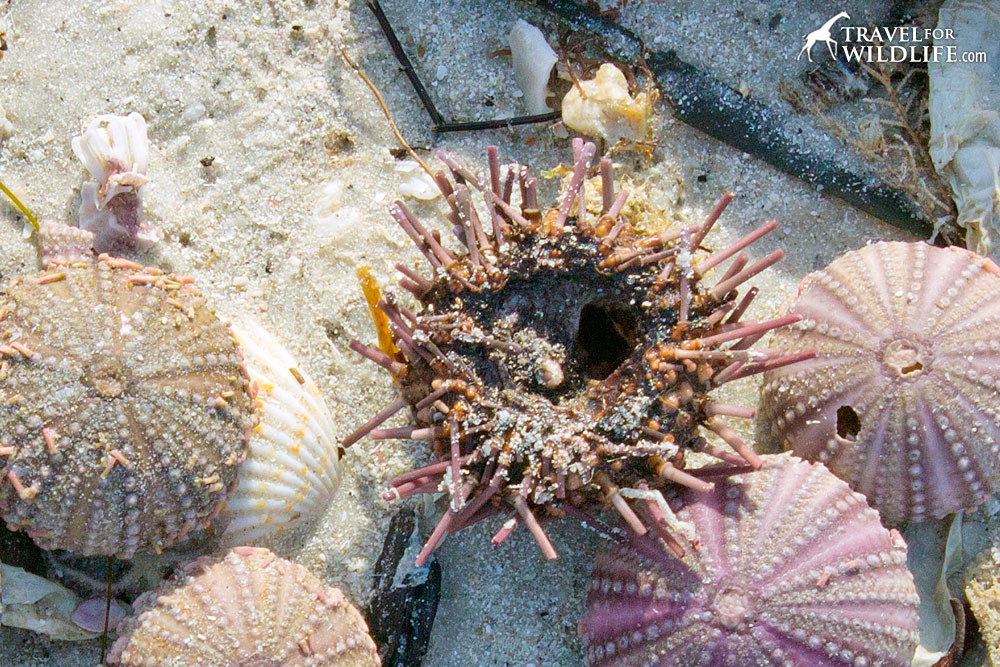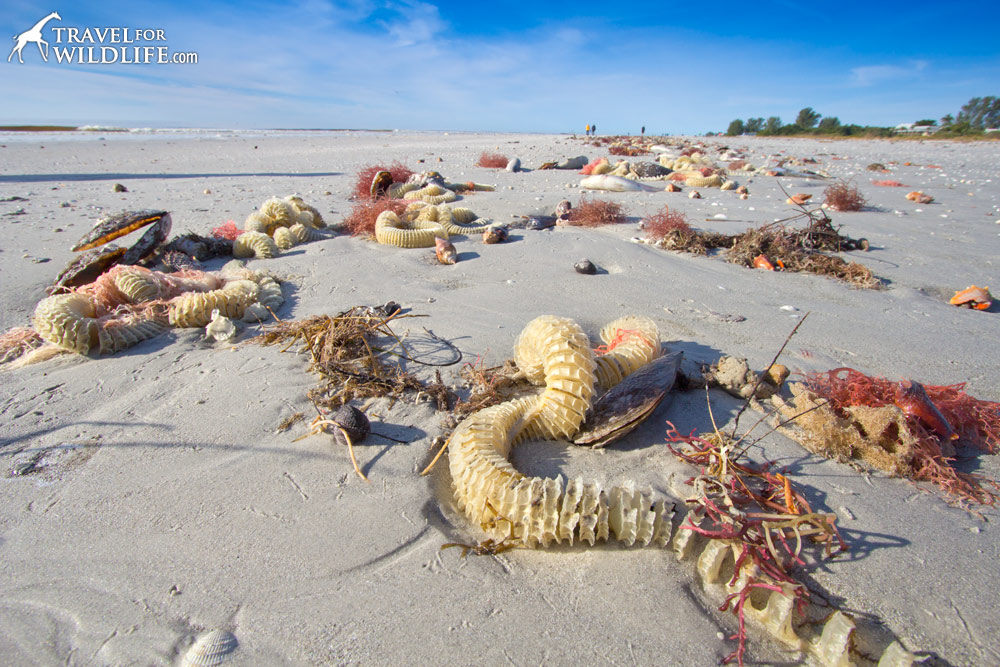How To Tell if a Sand Dollar, Starfish, Egg Case, Urchin, or Sea Shell is Alive or Dead
Here are some quick tips on how to determine if a sea creature you find on the beach is alive or dead so you don’t accidentally kill any living animals when you’re trying to collect sea shells! For more great tips on eco-friendly seashell collecting, be sure to also read our other post A Guide To Ethical Shell Collecting!
How to tell if a sand dollar is alive or dead.
If a sand dollar is bleached white and appears completely bald (has no tiny “hairs” or spines on it) then it is definitely dead.

How to tell if a sand dollar is dead. It is white and completely “bald” with no small bristly hairs then it is definitely dead.
If a sand dollar is brown and velvety-looking, then it is probably alive. Look at the back and see if the tiny little spines are moving. If you’re not sure, let it be or return it to the ocean!

How to tell if a sand dollar is alive. Living sand dollars are brown in color and “hairy” looking with tiny bristles all over. Inset shows tiny spines on underside.
How to tell if a starfish is alive or dead.
Starfish get around using thousands of tiny tentacles, called tube feet, on the bottom of each arm. If you look closely at the underside of a starfish and see these tiny tentacles moving, then the starfish is definitely alive! If you don’t see movement but want to be sure, try touching the tube feet gently or placing it in the water to see if the tube feet start moving. If you’re not sure, leave it be or gently return it to the ocean! Plus they are notoriously disgusting smelling if you try to dry one for your collection. Why not leave it for the crabs and birds to eat?

How to tell if a sea star (starfish) is alive or dead: look for moving “tube feet” on the bottom of each arm.
How to tell if a skate egg case is alive or dead.
There are many beautiful egg cases that get washed up on beaches. One often found on the Atlantic coast of the U.S. is sometimes referred to as a “Devil’s Purse” or “Mermaid’s Purse”. It is the egg case for a skate (usually a Clearnose Skate) which is a close relative of rays and sharks. If a skate egg case is split open on one end between the “horns” and is empty inside then it is definitely dead and no longer has an embryo inside! If the case is intact and has fluid inside, then it’s very possible that a living skate embryo is still inside. Try holding it up to the sun and looking through it to see if there is movement. In the photo below you can see a fairly undeveloped embryo, but it will eventually grow to be a perfectly formed small skate before the egg case splits open and releases the baby skate into the sea!

How to tell if a skate egg case is alive. If it is full of fluid, hold it up to the sun and look for the skate embryo inside!
Whether I see movement or not, I always return unopened egg cases back to the sea, just in case. Maybe that skate will save your life one day in return!
Other beautiful egg cases include the long spirals of lightning whelks…
and the strange masses made by various conchs and tulips.
It’s a lot harder to tell if these are still viable so I always return them to the sea.
You can try the same trick with whelk egg cases by holding them up to the light to look through them. If you see tiny things floating within a fluid inside, those are perfect miniature baby lightning whelks and probably alive!

If you see tiny blobs inside a Lightning Whelk egg case, those are hundreds of tiny Lightning Whelks inside!
How to tell if a sea urchin is alive or dead.
Living sea urchins have short or long spines protruding all over their bodies. If you find an urchin with the spines intact, it may be alive. You can try to carefully return it to the sea with a bucket or shovel. If an urchin shell is “bald” with no spines at all, and empty inside then it is definitely dead.

How to tell if a sea urchin is dead. If it is “bald” with no spines and is hollow inside, like these urchin shells on Sanibel, it is definitely dead.

Living sea urchins are covered with spines, but if it’s hollow inside like this one, then it is dead.
How to tell if a sea shell is alive or dead.
If a bivalve shell is intact, and both halves are tightly closed together, then there is still a living creature inside.

How to tell if a bivalve sea shell is alive. If the two halves of the shell are tightly closed together, like this Spiny Jewel Box, then it is alive!
You may also encounter living bivalves with their shell open that may be feeding in shallow pools or stranded by storms. If you touch them and they close their shell, then of course they are alive!

If you find a bivalve shell open, it may still be alive like this Cockle. If you touch it and it closes then it’s definitely alive!
If you’re not sure then err on the side of caution and place it gently back in the sea.
With spiral shells simply look inside! If you see anything in there, whether it’s the original mollusk or a hermit crab tucked deep inside, then it’s probably alive. Feel free to return it gently to the ocean! (Though if it smells really horrible then it’s probably dead.)

How to tell if a spiral sea shell is alive or dead. If you see any animal inside, it’s probably alive. If it’s moving like this Horse Conch then it’s definitely alive!
Many mollusks that live in spiral shells have what is called an operculum. It’s like a hard flat door that they use to close themselves tightly into their shell. If you seen an operculum blocking the entrance, then there is a living animal inside! If you’re not sure, leave it be.

How to tell if a spiral shell is alive. If there is a “door” closing the shell (the operculum) like this Lightning Whelk, then it is alive!

You can tell this Apple Murex shell is alive because the operculum (the tiny “door”) is tightly blocking the opening.
For more great eco-friendly shell collecting ideas, be sure to read our article A Guide To Ethical Shell Collecting!
Want to see more of the amazing creatures I found on Sanibel? Check out my photo gallery: The Living Shells: A Photo Gallery of Sanibel Island Seashore Creatures.
Did you find this article helpful? Pin this image!
The post How To Tell if a Sea Shell, Sand Dollar, Starfish, Egg Case, or Urchin is Alive or Dead appeared first on Travel For Wildlife .


